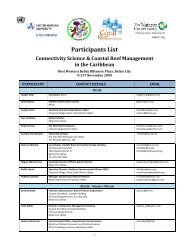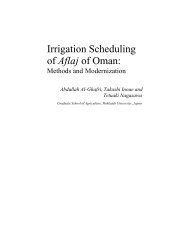The Global Water Crisis: Addressing an Urgent Security - Unu-inweh ...
The Global Water Crisis: Addressing an Urgent Security - Unu-inweh ...
The Global Water Crisis: Addressing an Urgent Security - Unu-inweh ...
Create successful ePaper yourself
Turn your PDF publications into a flip-book with our unique Google optimized e-Paper software.
Below are some suggestions for how the water crisis in the WANA region c<strong>an</strong> be m<strong>an</strong>aged through cooperation.<br />
• <strong>The</strong> regional WANA Forum Initiative. With <strong>an</strong> aim of realizing regional cooperation, the WANA Forum was<br />
founded in 2009 for <strong>an</strong> initial 5-year period with the aim of becoming a platform for new regional thinking based<br />
on shared values <strong>an</strong>d interest in the common good. <strong>The</strong> Forum is apolitical, non-partis<strong>an</strong> <strong>an</strong>d <strong>an</strong> independent<br />
platform for dialogue (Hashemi, 2011). <strong>The</strong> dialogue centers on the formation of a regional perspective on the<br />
govern<strong>an</strong>ce of water <strong>an</strong>d l<strong>an</strong>d resources, <strong>an</strong>d a policy brief has been developed on supra-national (inter-state)<br />
govern<strong>an</strong>ce mech<strong>an</strong>isms for cooperation to deal with water scarcity in the region (WANA Forum, 2011). <strong>The</strong><br />
WANA Forum Chairm<strong>an</strong>, Prince El Hass<strong>an</strong> Bin Talal of Jord<strong>an</strong>, has stated that<br />
“there exists <strong>an</strong> opportunity for the region in addressing its water scarcity crisis. <strong>The</strong> scarcity of water<br />
in the region, coupled with <strong>an</strong> abund<strong>an</strong>ce of natural energy resources, offers the potential for <strong>an</strong><br />
exch<strong>an</strong>ge or trade-off, one comparable to that of Europe in the 1950s, between Fr<strong>an</strong>ce <strong>an</strong>d Germ<strong>an</strong>y.<br />
Indeed, it is the common pooling of resources – energy <strong>an</strong>d water – that c<strong>an</strong> lead to <strong>an</strong> integration<br />
of economic infrastructure <strong>an</strong>d political systems. Such a system – as the example of the Europe<strong>an</strong><br />
Union has demonstrated – c<strong>an</strong> herald <strong>an</strong> era of nation-state cooperation <strong>an</strong>d multilateral thinking,<br />
fostering relationships <strong>an</strong>d building trust. Economic <strong>an</strong>d political integration c<strong>an</strong> therefore become a<br />
fundamental part of positively <strong>an</strong>d proactively addressing the socio-economic <strong>an</strong>d political aspects<br />
of water <strong>an</strong>d energy. With a shared history <strong>an</strong>d values, the resources c<strong>an</strong> be agents of cooperation<br />
<strong>an</strong>d the creation of a Community of <strong>Water</strong> <strong>an</strong>d Energy c<strong>an</strong> pave the way to cooperation, <strong>an</strong>d arrest<br />
potential conflict” (Bin Talal, 2010).<br />
This offers hope for positive cooperation in the region in the future.<br />
• Enh<strong>an</strong>cing cultural heritage for regional cooperation. <strong>The</strong> WANA Forum further aims to enh<strong>an</strong>ce the cultural<br />
ties in the region by involving other key players in the region including, Ir<strong>an</strong>, Turkey, Pakist<strong>an</strong> <strong>an</strong>d Afgh<strong>an</strong>ist<strong>an</strong>, as<br />
part of the WANA region. For example, in the past 20 years, Turkey has examined the possibilities of exporting<br />
water through a ‘peace’ pipeline; a project was proposed to supply Syria, Jord<strong>an</strong>, Palestine, Israel, <strong>an</strong>d Saudi<br />
Arabia with water. <strong>The</strong> recently published report Blue Peace: Rethinking Middle East <strong>Water</strong>s (Strategic Foresight<br />
Group, 2011) states that, on average, Turkey c<strong>an</strong> export at least 1-1.5 billion m 3 from its national rivers (excluding<br />
the Tigris <strong>an</strong>d Euphrates rivers) to the Jord<strong>an</strong> River valley countries. As the 2010 <strong>Global</strong> Risks report highlights,<br />
the impact of declining quality <strong>an</strong>d qu<strong>an</strong>tity of water will be increasingly severe in the forthcoming years (World<br />
Economic Forum, 2010). <strong>The</strong>refore, building on common values c<strong>an</strong> bring satisfactory solutions to tr<strong>an</strong>sboundary<br />
water resources issues in the region.<br />
• New regional administrative systems. In the context of regional cooperation, the benefits of IWRM need to be<br />
examined to determine what role it might play, how it might function, <strong>an</strong>d what potential it holds for the region.<br />
Most – if not all – decisions regarding water are political. <strong>The</strong> underlying theoretical background of IWRM is<br />
integration itself – which is a political process – <strong>an</strong>d is in line with the concept of sustainable development that<br />
c<strong>an</strong> meet the needs of people without compromising the value of the ecosystem, demonstrating the hum<strong>an</strong><br />
element in m<strong>an</strong>aging water <strong>an</strong>d natural resources. <strong>The</strong> numerous dimensions to successful integration, such as<br />
institutional reforms, spatial adequacy <strong>an</strong>d m<strong>an</strong>ageability, are inextricably linked to social cohesion <strong>an</strong>d unity. In<br />
addition, integrated research policy that reflects the multitude of factors in integrated m<strong>an</strong>agement is required<br />
in order for IWRM to play a key role in integration <strong>an</strong>d m<strong>an</strong>agement. In addition to the juridical <strong>an</strong>d historical<br />
background of the region, <strong>an</strong>other import<strong>an</strong>t issue to be taken into consideration is the people of the Euphrates,<br />
the Orontes, the Yarmouk <strong>an</strong>d the Nile rivers, together with their 11 Afric<strong>an</strong> states. In this respect, the formation<br />
of regional water commissions, such as those like the D<strong>an</strong>ube, the Rhine <strong>an</strong>d the Mekong Commissions, could<br />
indeed help to promote regional cooperation rather th<strong>an</strong> wars, as wars do not create additional water.<br />
• A regional database <strong>an</strong>d information system. In order to realise both IWRM <strong>an</strong>d a region-wide knowledgebase,<br />
there must exist <strong>an</strong> awareness of, <strong>an</strong>d underst<strong>an</strong>ding between, the various actors <strong>an</strong>d org<strong>an</strong>isations working in<br />
WANA. Too often information is compiled only for the purpose of recommendation research, publications <strong>an</strong>d<br />
conclusions to be carried out independently of work being done elsewhere, failing to take into account the broader<br />
picture. It is therefore proposed that work is needed at three levels, the national, regional, <strong>an</strong>d global levels, each<br />
working in harmony with the others towards the same objectives. Furthermore, it is recommended that such<br />
<strong>Water</strong> <strong>an</strong>d Political <strong>Security</strong>: Conflict in West Asia <strong>an</strong>d North Africa<br />
Part 1<br />
53




